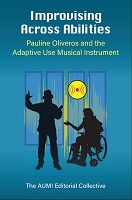Improvising Across Abilities
External Review of Whole Manuscript
Pauline Oliveros and the Adaptive Use Musical Instrument
Contributor(s)
Ciufo, Thomas (editor)
Dvorak, Abbey L. (editor)
Haaheim, Kip (editor)
Hurst, Jennifer (editor)
Leu, Grace Shih-en (editor)
Miller, Leaf (editor)
Mizumura-Pence, Ray (editor)
Oddy, Nicola (editor)
Stewart, Jesse (editor)
Sullivan, John (editor)
Tucker, Sherrie (editor)
Waterman, Ellen (editor)
Wilks, Ranita (editor)
Language
EnglishAbstract
Improvising Across Abilities: Pauline Oliveros and the Adaptive Use Musical Instrument (AUMI) brings together scholars, musicians, and family members of people with disabilities to collectively recount years of personal experiences, research, and perspectives on the societal and community impact of inclusive musical improvisation. One of the lesser-known projects of composer, improviser, and humanitarian, Pauline Oliveros (1932–2016), the AUMI was designed as a liberating and affordable alternative to the constraints of instruments created only for normative bodies, thus opening a doorway for people of all ages, genders, abilities, races, and socioeconomic backgrounds to access artistic practice with others. More than a book about AUMI, this book is an invitation to readers to use AUMI in their own communities.
This book, which contains wisdom from many who have been affected by their work with the instrument and the people who use it, is a representation of how music and extemporized performance have touched the lives and minds of scholars and families alike. Not only has AUMI provided the opportunity to grow in listening to others who may speak differently (or not at all), but it has been used as an avenue for a diverse set of people to build friendships with others whom they may have never otherwise even glanced at in the street. By providing a space for every person who comes across AUMI to perform, listen, improvise, and collaborate, the continuing development of this instrument contributes to a world in which every person is heard, welcomed, and celebrated.


 Download
Download